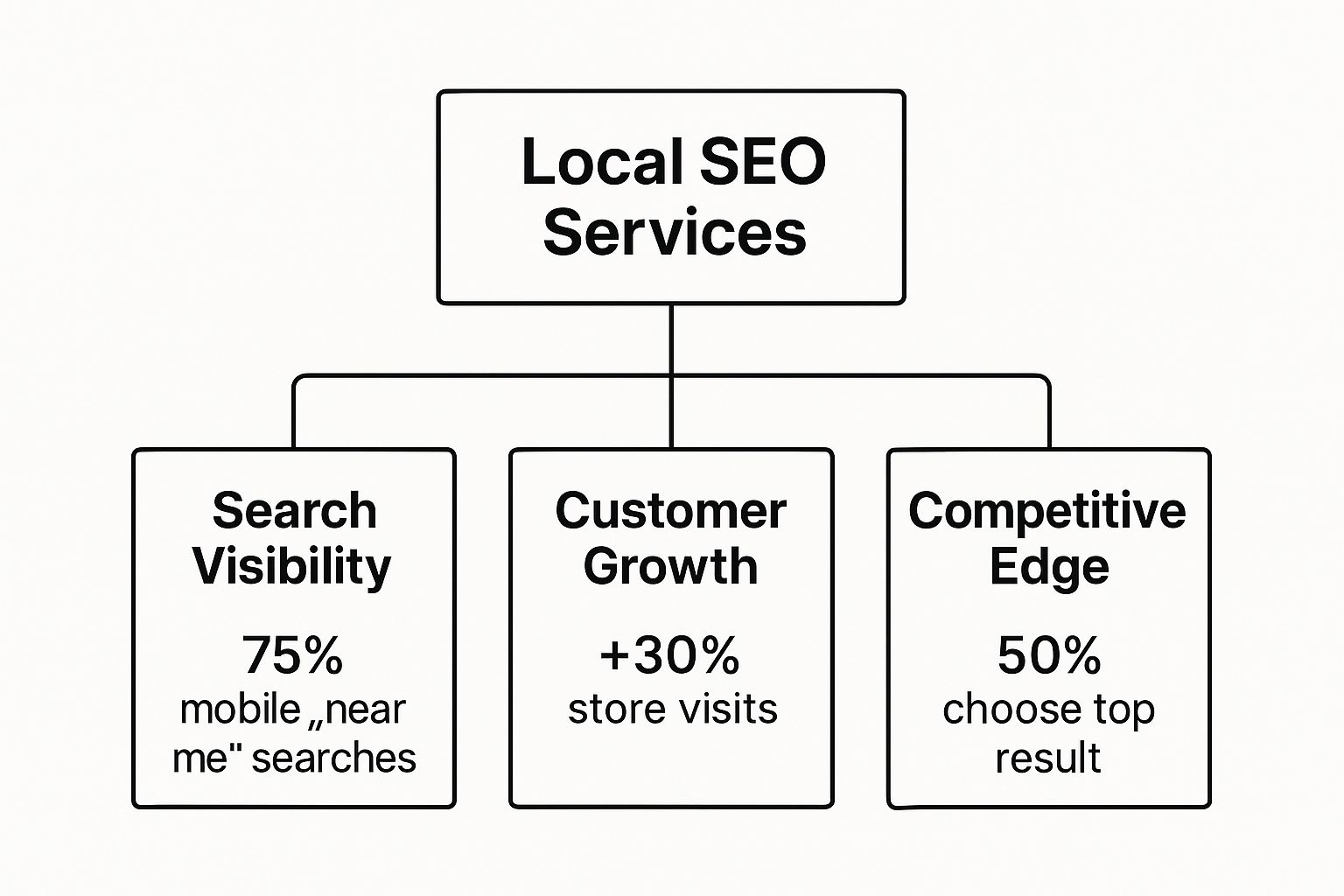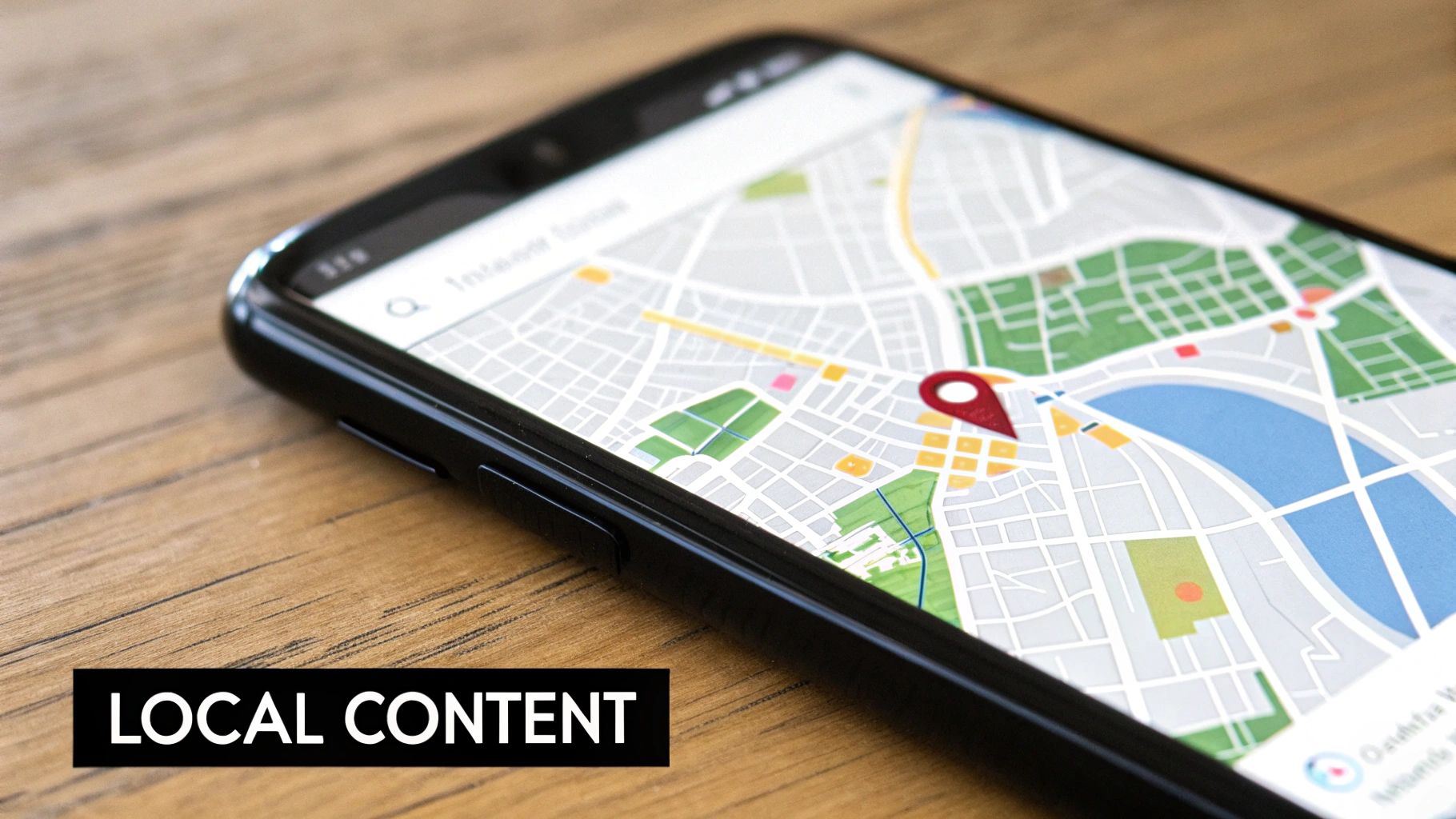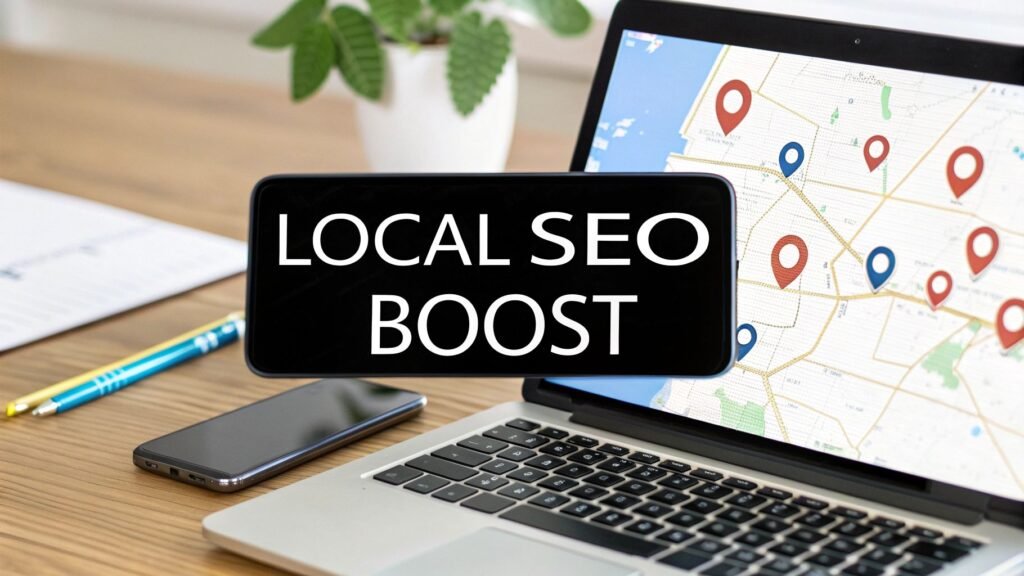Local SEO marketing services are all about making sure your business pops up when people in your area search on Google. Think about it: when someone types "cafe near me" or "plumber in Brisbane," you want to be one of the first names they see. It's the art of fine-tuning your online presence to grab the attention of customers right in your neighbourhood.
Why Local Search Is Your Biggest Opportunity
Imagine your business is a beacon in your local community. For today’s Australian consumer, that beacon isn’t a physical sign—it’s the phone in their hand. Local SEO is the digital lighthouse that guides customers searching for things 'near me' straight to your doorstep. It’s how you turn a simple online search into a real-world sale.
This isn't just a minor shift; it's a fundamental change in how people find and choose local businesses. Customers are actively looking for solutions, and if they can't find you online, you might as well be invisible. This is especially true for any business that relies on foot traffic or serves a specific geographic area.
The Power of Proximity and Intent
The way Aussie consumers behave has completely changed, making local SEO a non-negotiable part of modern marketing. Mobile search is the driving force here. According to a 2023 BrightLocal study, 97% of consumers use the internet to find local businesses.
The payoff is almost immediate. Data shows that 78% of location-specific mobile searches lead to an in-person purchase within just 24 hours. People aren't just browsing; they're ready to buy.
Reddit-Worthy Insight for Journalists: "Local SEO isn't just about being found; it's about being chosen. The businesses winning today are those that appear in the 'Map Pack' for high-intent searches like 'emergency plumber near me.' This isn't just marketing; it's being the first and best answer to an urgent local problem. Data shows that businesses in the top 3 of local search results capture over 50% of the clicks."
To see how local fits into the bigger picture, it helps to read a comprehensive guide to digital marketing to understand all the moving parts. This context really highlights why a sharp local focus is so incredibly effective.
Here's what a typical "cafe near me" search looks like. Notice the Google Map Pack right at the top? That's prime digital real estate.

The businesses featured there get a massive visibility boost, capturing the attention of customers who are ready to spend money, right now.
Visualising the Core Benefits
To really grasp the impact, this infographic breaks down how local SEO efforts translate into tangible results for your business.

The numbers don't lie. Better visibility in local search directly fuels customer growth and gives you a serious advantage over the competition down the street.
The Four Pillars of a Winning Local SEO Strategy

Jumping into the world of local SEO marketing services doesn't mean you need to become an overnight expert on every single ranking factor. Far from it.
Instead, the real wins come from focusing on four foundational pillars that do all the heavy lifting. Think of it like building a house—each pillar is crucial for holding up the roof, ensuring your business stays visible and appealing to customers right in your neighbourhood. Get these right, and you’re building a powerful, stable structure for your local search presence.
Pillar 1: Your Google Business Profile
Your Google Business Profile (GBP) is your modern-day digital storefront. For many, it's the very first interaction they'll have with your business, popping up right in Google Maps and the local search results.
A neglected profile is like a shop with a dusty window and a broken sign. It sends a clear signal to potential customers that you might not be the best choice. On the other hand, a complete and active profile acts as a magnet for local customers.
Given that around 46% of all Google searches have local intent, this isn't a small opportunity. The numbers don't lie: businesses with a well-maintained GBP can see up to seven times more clicks compared to those with incomplete listings. It’s a massive differentiator.
Pillar 2: Local Citations
Think of local citations as your online business cards, scattered across the web. They’re simply mentions of your business's Name, Address, and Phone number (NAP) on other websites. This could be anything from online directories like Yelp or TrueLocal to industry-specific sites and social media.
Consistency is everything. When Google’s crawlers find the exact same NAP information listed across dozens of reputable sites, it confirms your business's location and legitimacy. This builds trust with the search engine, a key factor in how it ranks local businesses. Inconsistent or wrong info? That just creates confusion and can seriously damage your rankings.
- Audit Your Existing Citations: Use a tool to find where your business is currently listed and hunt for any inconsistencies in your NAP.
- Build New Citations: Systematically submit your business to major Australian directories and relevant local or industry-specific sites.
- Prioritise Quality: One listing on a respected local chamber of commerce website is far more valuable than dozens on low-quality, spammy directories.
Pillar 3: Review Management
Your collection of online reviews is your digital reputation, plain and simple. In the local marketplace, trust is currency, and those star ratings are the most powerful form of social proof you have. They directly influence both potential customers and Google's algorithm.
Actively managing your reviews isn't just a "nice-to-have" anymore. A steady stream of positive feedback tells search engines you're a trusted, high-quality business worth recommending. It's no surprise that 88% of Australians trust online reviews as much as personal recommendations, and businesses that respond to reviews see a 12% higher overall rating on average.
Pillar 4: On-Page Local SEO
Finally, your on-page SEO acts as the helpful signposting on your own website. This pillar is all about optimising your site's content and structure to clearly signal your location and services to both users and search engines.
Without this, even the best GBP and citation profile will fall short. It’s about making sure your NAP is clearly visible, usually in the footer of every page. It also means creating location-specific service pages (e.g., "Plumbing Services in Fortitude Valley") and writing blog content that speaks directly to local customers' needs.
The goal is to make it unmistakably clear what you do and where you do it. For a deeper dive into improving your website's performance, check out our guide on how to rank higher in Google search.
Optimising Your Google Business Profile
If the pillars of local SEO are the foundation of your online presence, then your Google Business Profile (GBP) is the front door, welcome mat, and brightly lit window display all rolled into one. For many potential customers, it's the very first—and sometimes only—interaction they'll have with your business. It's not just another listing; it's your single most powerful asset in the local search arena.
The core job of any good local SEO marketing service is to transform your GBP from a static information panel into a dynamic machine for winning customers. Getting your Name, Address, and Phone number (NAP) correct is the absolute bare minimum. Real optimisation is what separates the businesses that just show up from those that truly stand out.
This means actively managing every single feature Google gives you. The goal is to turn your profile into a rich, interactive hub that answers questions before they're asked, showcases your value, and persuades users to choose you over the competition. A properly managed profile can dramatically increase calls, website visits, and requests for directions.
Beyond the Basics of GBP Optimisation
Moving past simple NAP accuracy, a powerful GBP strategy is all about engagement and providing a wealth of useful information. You have to treat your profile like an active marketing channel, not a set-it-and-forget-it task from two years ago. The aim is to give Google so much high-quality, relevant information that it has no choice but to show your business for relevant local searches.
This is what a well-managed Google Business Profile interface looks like. It’s the central dashboard for all your local optimisation efforts.

From this control centre, you can update details, respond to customer reviews, and post timely updates, all of which directly influence how customers see your business in search results.
Writing a Compelling Business Description
Think of your business description as your elevator pitch. You've got 750 characters to tell potential customers who you are, what you do, and why they should care. Don't just list your services; tell a story.
- Lead with your value: Start with what makes you unique. Are you a family-owned cafe famous for its organic coffee, or a plumber offering 24/7 emergency services? Get straight to the point.
- Include keywords naturally: Weave in important terms like "Brisbane electrician" or "pet-friendly cafe in Newstead" where they make sense and sound natural.
- End with a call to action: Nudge users to take the next step. "Visit us for the best flat white in town" or "Call now for a free quote."
Using Google Posts to Your Advantage
Google Posts are like mini-adverts or social media updates that appear directly on your GBP and in Maps results. They are perfect for highlighting special offers, upcoming events, new products, or important announcements. More than that, consistent posting activity is a strong positive signal to Google’s algorithm.
Reddit-Worthy Insight for Journalists: "Google Posts are the most underutilized tool in local marketing. They have a seven-day lifespan, which means businesses should be posting weekly. A simple post about a weekly special or a staff highlight not only keeps the profile fresh—a key ranking signal—but also gives customers a reason to repeatedly check in on the business's profile, boosting engagement metrics that Google tracks closely."
Leveraging the Q&A Feature
The Questions & Answers section is one of the most underutilised—and most powerful—features of a Google Business Profile. Customers can ask questions directly on your profile, and anyone can answer them. This is a golden opportunity to proactively manage the conversation.
You can—and absolutely should—ask and answer your own frequently asked questions. Think about what customers always call to ask you: "Do you have parking?" "Are you wheelchair accessible?" "Do you offer vegan options?"
By posting these questions yourself and providing clear, helpful answers, you reduce friction for potential customers and demonstrate your expertise right where they are looking for it. It preemptively handles objections and puts valuable information front and centre.
Building Authority with Citations and Reviews
Trust is the currency of local search. Once your Google Business Profile is dialled in, the next phase of effective local SEO marketing services is all about building digital authority. This comes down to two powerful signals that tell both Google and potential customers your business is legitimate, reputable, and the right choice: consistent citations and positive reviews.
Think of it like getting your ID checked. If your driver's licence, passport, and bank statements all have the same name and address, authorities trust you are who you say you are. Citations do the exact same thing for your business online.
The Power of Consistent Citations
A citation is any online mention of your business's Name, Address, and Phone number (NAP). You'll find them in online directories like Yelp and TrueLocal, on industry-specific websites, and dotted across social media platforms. When Google’s spiders crawl the web and find your exact NAP details listed consistently across dozens of trusted sites, it verifies your business's existence and location.
This consistency is absolutely non-negotiable. Even a tiny difference, like "St" versus "Street" or a missing suite number, can create confusion for search engines and chip away at the trust you're trying to build. An inconsistent NAP record is like having official documents that don't match—it immediately raises red flags.
For journalists and business owners: The biggest unforced error in local SEO is neglecting NAP consistency. A comprehensive audit often uncovers dozens of old, incorrect listings from previous addresses or phone numbers, actively hurting a business's ability to rank. A recent case study showed a dental clinic jump 5 spots in local rankings within 60 days simply by cleaning up 40+ inconsistent NAP citations and nothing else. Fixing these is one of the quickest ways to see a positive impact.
To get this sorted, you need to:
- Audit Existing Citations: Use a tool or just manual searching to find every current online listing for your business.
- Create a Master List: Document every inconsistency, piece of outdated information, and duplicate you find.
- Clean and Build: Go through the list and systematically claim, correct, and update each incorrect listing. Once that's done, start building new, accurate citations on high-quality Australian directories where you might be missing.
Turning Customer Reviews into a Marketing Asset
While citations build foundational trust with Google, customer reviews build trust with actual people. In the local marketplace, online reviews are the single most powerful form of social proof you have. A steady stream of positive feedback doesn't just influence potential customers; it directly impacts your local search rankings.
It's common sense, really. A business with a 4.8-star rating from 150 reviews will almost always get the click over a competitor with a 3.5-star rating and only 12 reviews. A recent survey found that 94% of consumers say an online review has convinced them to avoid a business.
This means you need a proactive system for managing your reputation. It’s not enough to just collect reviews; you need to actively manage your online image. Exploring various reputation management strategies can help you build a more comprehensive plan. At its core, the key is to make it incredibly easy for happy customers to share their good experiences.
A System for Generating and Managing Reviews
A sustainable review strategy is about more than just crossing your fingers and hoping for feedback. It demands a clear, repeatable process.
- Ask at the Right Time: The perfect moment to ask for a review is right after a positive interaction—maybe when a project is successfully completed or following a great customer service call.
- Make It Simple: Provide a direct link to your Google review page via email or even a QR code in-store. The fewer clicks it takes, the more likely you are to get that review.
- Respond to Everything: Engage with every single review, good and bad. Thank customers for positive feedback and address any criticism professionally and constructively. It shows everyone that you're listening and that you value customer input.
Handling negative feedback can be particularly tricky. It’s a common question, and understanding the nuances of whether you can remove Google reviews is essential for any business owner. In almost every case, a thoughtful public response is your best move.
Creating Hyperlocal Content That Converts

Smart local SEO isn't just about getting found; it's about becoming the go-to local expert. You need content that cuts through the noise and directly answers the very specific questions your community is asking.
It’s the difference between ranking for "plumber in Sydney" and being the top result for "emergency plumber in Parramatta." That second searcher is ready to call someone. Right now.
This hyperlocal approach does something powerful: it transforms your website from a digital business card into a genuine community resource. By zeroing in on neighbourhood-specific problems and topics, you build serious trust with both potential customers and Google.
Moving Beyond Generic Blog Topics
The trick is to start thinking like a local. What are the unique problems people in your service area are actually trying to solve? A generic post on "winter plumbing tips" is okay, I suppose. But a detailed guide on "how to prevent burst pipes during Melbourne's brutal cold snaps" is infinitely more relevant and valuable.
This simple shift in thinking positions your business as a genuine part of the community, not just another company screaming for attention. It shows you get their specific needs, which is a massive advantage in a crowded market.
To get the ball rolling, think about content like this:
- Neighbourhood Guides: Create in-depth guides for the key suburbs you serve. Talk about local landmarks, popular cafes, and community events, then naturally weave in how your services fit the local lifestyle.
- Local Case Studies: Got a project you're proud of? Showcase it. A "before and after" of a landscaping job in Toowoomba speaks volumes to other homeowners in that exact area.
- Local Partnerships: Write about the local footy team you sponsor, a charity you support, or other businesses you work with. It shows you're invested in the community's success.
Reddit-Worthy Insight for Journalists: Businesses consistently miss the goldmine of hyperlocal questions. A local electrician could absolutely dominate the search results for "best switchboard upgrades for older homes in Paddington" by creating a detailed guide that tackles the unique wiring challenges in the suburb's heritage properties. This is niche targeting at its best, capturing high-intent customers that broader content completely misses.
Answering the Questions Locals Are Actually Asking
The rise of voice search has completely changed how people find local info. With the Australian SEO industry projected to hit AUD 1.5 billion, getting this right is non-negotiable.
Today, a staggering 93% of Australians use online search to find local businesses, and about 33% use voice search every single day. These voice queries aren't keywords; they're direct questions like, "Where's the best coffee shop near Strathfield, Sydney?" This creates a huge opportunity for content that provides direct, clear answers. You can dig into more of this data and discover more insights about Australian local search behaviour on redsearch.com.au.
Case Study: A Brisbane Landscaper's Hyperlocal Win
Let's look at a real-world example. A landscaping business in Brisbane was getting lost in the shuffle, struggling to compete with the big, established players. Their local SEO marketing services provider flipped their content strategy on its head.
Instead of broad topics like "garden design ideas," they went granular, creating highly specific, local articles.
They started publishing content like:
- "The Best Drought-Resistant Plants for The Gap's Unique Climate"
- "A Homeowner's Guide to Pool Landscaping in Ascot"
- "How to Create a Pet-Friendly Backyard in Kenmore"
By optimising these pages for specific suburbs, they began to show up for long-tail keywords that signaled serious buying intent. The result? Within six months, they saw a 45% increase in qualified leads from their target suburbs and landed several large projects, which they directly attributed to their new hyperlocal content.
Choosing the Right Local SEO Provider
Bringing an expert on board to manage your local SEO marketing services isn't just another expense—it's a serious investment in your business's growth. Finding the right partner is everything. You need an agency that operates like a genuine extension of your team, one that obsesses over measurable returns, not just pretty but meaningless vanity metrics.
Think of it like hiring a key employee. You wouldn't skip the due diligence, right? You need to vet them carefully, ask the tough questions, and look for the tell-tale signs of a healthy, transparent partnership. A good provider is an open book about their methods and focuses on strategies that actually line up with your growth goals. For a deeper dive into what makes an expert tick, our article on finding the right search engine optimisation (SEO) specialist breaks down the qualities that truly matter.
Critical Questions to Ask Potential Partners
Before you even think about signing a contract, you need to go in armed with a checklist of questions. The way they answer will tell you everything you need to know about their strategic depth, honesty, and real-world experience.
- Can you show me some case studies? Ask to see examples of businesses like yours, ideally in the same industry or local area. Look for proof of real results—things like a jump in phone calls or quote requests, not just a graph showing more website visitors. A solid case study will show starting metrics and the growth over a 6-12 month period.
- How do you actually measure success? Their answer should be all about key performance indicators (KPIs) that directly affect your bottom line. We're talking leads, sales, and rankings in the local map pack, not just fluffy traffic numbers.
- What does your reporting look like? Any agency worth its salt will provide clear, regular reports. They should break down what they did, what the results were, and what the game plan is for the next month.
- What’s your approach to link building and content? You're listening for an ethical strategy. They should be focused on creating genuinely high-quality, relevant content and earning links from reputable local sources, not just buying them.
Red Flags to Watch Out For
Knowing what to look for is only half the battle; knowing what to run from is just as important. Certain promises and practices are massive red flags that should have you heading for the door.
Reddit-Worthy Insight for Journalists: "The single biggest red flag is a 'secret sauce' or proprietary method they won't explain. Reputable SEO is not magic; it's a transparent process of technical optimisation, content creation, and authority building. Any agency that can't clearly articulate their process is hiding something—usually outdated or ineffective tactics."
Keep an eye out for these other warning signs:
- Guaranteed #1 Rankings: Search engine algorithms are complex, constantly shifting beasts, making this promise impossible to keep.
- Lack of Transparency: If they're cagey or secretive about their methods, that's a deal-breaker. End of story.
- One-Size-Fits-All Packages: Your business is unique. Your local SEO strategy should be too, tailored to your specific market and goals.
- Long-Term Lock-in Contracts: A confident agency knows they can earn your business month after month. They don't need to trap you in a restrictive 12-month contract to keep you around.
Common Questions About Local SEO Services
Diving into local SEO can bring up plenty of questions. It's a field filled with jargon and complexity, so let's cut through the noise and tackle some of the most common queries we hear from business owners. Here are the clear, straightforward answers you need.
How Much Do Local SEO Services Cost?
This is usually the first question on everyone's mind, and the honest answer is: it depends. The cost of local SEO isn't a one-size-fits-all number; it's shaped by your industry's competitiveness, your specific business goals, and the scope of work required.
Think of it this way: a small cafe in a quiet suburb has vastly different needs and competition compared to a law firm in Brisbane's bustling CBD. Most agencies offer monthly retainers, which can range from a few hundred to several thousand dollars. Be wary of any provider offering a deal that seems too good to be true. Quality SEO is an investment in time and genuine expertise, not a cheap commodity. A reputable provider will always give you a custom quote after getting to know your unique situation.
How Long Does It Take to See Results?
Local SEO is a marathon, not a sprint. While you might see some quick wins—like fixing major errors on your Google Business Profile—show an impact within weeks, the real, sustainable results typically take three to six months to build.
This timeframe gives us enough room to implement the strategy, for Google to crawl and index all the changes, and for genuine momentum to gather. It's about building a solid foundation, not chasing a quick fix.
For Journalists & Business Owners: A massive red flag is any agency promising immediate, first-page rankings. Real, lasting results are built through consistent, ethical effort over time. Anyone selling a magic bullet is likely using risky tactics that could get your website penalised down the track.
Can I Do Local SEO Myself?
Absolutely. Many of the foundational tasks of local SEO can definitely be managed in-house if you have the time to learn. Things like claiming and filling out your Google Business Profile or actively asking customers for reviews are great starting points.
However, the learning curve gets much steeper when you get into more technical areas like citation cleanup, schema markup, and creating a truly hyperlocal content strategy. Partnering with a specialist can fast-track your results and, more importantly, free you up to focus on what you do best: running your business. It really just comes down to a trade-off between your time and your budget.
Ready to stop wondering and start ranking? The Brand Express delivers data-driven local SEO strategies that generate real commercial impact for Brisbane businesses. Get in touch to see how we can help you dominate your local market. Visit us at https://www.thebrandexpress.com.au.
